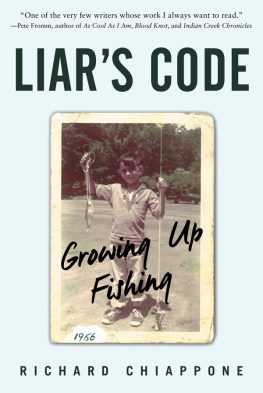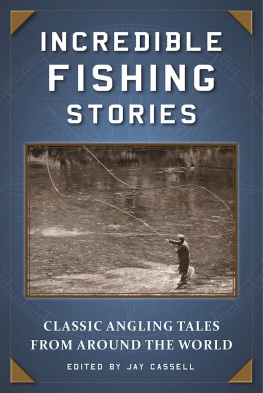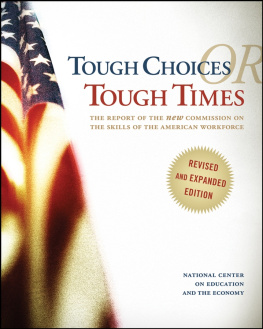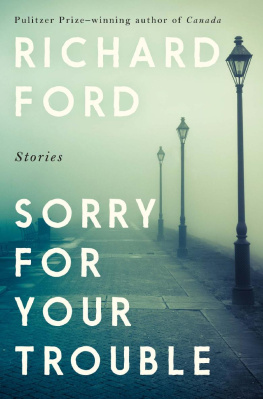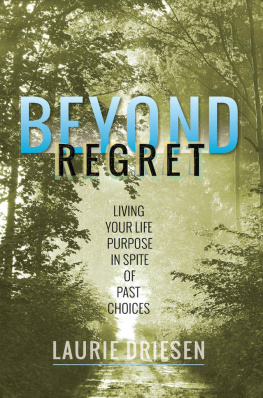Water of an Undetermined Depth
Copyright 2002 by Richard Chiappone
Published by
STACKPOLE BOOKS
5067 Ritter Road
Mechanicsburg, PA 17055
www.stackpolebooks.com
All rights reserved, including the right to reproduce this book or portions thereof in any form or by any means, electronic or mechanical, including photocopying, recording, or by any information storage and retrieval system, without permission in writing from the publisher. All inquiries should be addressed to Stackpole Books, 5067 Ritter Road, Mechanicsburg, Pennsylvania 17055.
Printed in the United States of America
First Edition
10 9 8 7 6 5 4 3 2 1
Library of Congress Cataloging-in-Publication Data
Water of an undetermined depth / Richard Chiappone.1st ed.
p. cm.
ISBN 0-8117-0033-X (hardcover)
1. Blue collar workersFiction. 2. Working classFiction.
3. MenFiction. I. Title.
PS3603.H52 W38 2002
813'.6dc21
2002008078
For Lin
Acknowledgments
Some of the stories in this collection appeared in the following publications:
Grays Sporting Journal: The Chubs, Winter Fish, Q Roo, Raccoon, Sick Baby
Missouri Review: Old Friend
New Virginia Review: Things Come to Mind
Playboy: Dealers Choice
Souwester: Those Little Foreign Beauties, Love A, Love B
ZYZZYVA: Maximum Reception
The Chubs also appeared in the anthology City Fishing, and Maximum Reception appeared in the anthology North of Eden.
I would also like to thank Ron Spatz (always the mentor and always a friend) and all the others who have tried to keep me honest: Sarah Birdsall, Matt Callahan, Bob Clark, Joann Congdon, Tara Wreyford, and the rest of the old gang; the editors Jim Babb, Howard Junker, Fred W. Robbins, Evelyn Somers, and Alice Turner; and a special thanks to Judith Schnell, whose idea this book was.
What did I know, what did I know of loves austere and lonely offices?
Robert Hayden, Those Winter Sundays
The Chubs
T hey are ugly little fish, the chubsfour or five inches long, thick-bodied and snub-nosed, with dull eyes and rude white mouths. They are trash fish, junk fish, and their presence in a stream is a sign that something good has come to an end. But they were the only things in the sluggish little creeks around my town that would rise to my home-tied flies and clumsy self-taught casts, and for a time one spring I was a chub fisherman.
Mornings I drove my father to his job at Hooker Chemical, my textbooks on the seat between us, my rod in the trunk behind the spare tire. My father sat with his lunch pail on his lap, his hard hat between his feet. He ran his fingers up and down the spines of my books as he talked about the jobs for college students at the plant.
Shipping, he said. Try for shipping, or labeling. Those are the cleanest, the safest. They dont pay like production, but youre only going to be there summers. I mean, if you were coming into the plant for the long haul, God forbid, then youd have to think seriously about the money. Capiche?
Labeling, I said. I was not really listening. We were in slow traffic on Buffalo Avenue. The morning sun slanted in between the factory walls, each beam of light flooded with graphite particles fluttering like a hatch of black insects. We had the windows down, and I could have closed my eyes and named the plants we passed: Carbide, reeking of rotten eggs the sulfur dioxide that even a failure at chemistry could identify; International Graphite, smoking like a new tar roof; DuPont, its eye-watering solvents stinging the warm morning air.
We pulled up in front of Hooker, the always-leaking chlorine gas deceptively clean and bleachy smelling. The stack whistle went off with a window-rattling blast, and a flock of gray and black pigeons burst from their roosts in the pipe racks overhead. I watched them flap away around the smokestacks in a panicked curve, as if theyd never heard that whistle before, as if they hadnt spent every day of their pigeon lives right there on those shit-splattered nests.
My father glanced at his watch. I wish I could get you into R and D. But the lab boys kids get those jobs every time.
I said, Thats all right, Pop.
Something on the windshield had my eye. A small brown caddisfly was crawling along the wiper blade, its speckled wings folded tentlike over its back. A #12, I thought. Maybe a #14. I had both sizes in my fly box in the trunk.
No, I mean it, my father said. I wish I had more juice with personnel. He had the door open and was backing out. He snugged his hard hat down onto his head.
I looked at the caddis again on the windshield. Definitely a size 14. Im not set on anything, I shrugged.
My father shook his head. Good Christ. You dont even know what to be afraid of.
I said, Im afraid Im going to hear the story of how Bobby Dimiglio caught twelve thousand volts from the bus bars on the chlorine cell. The burns? The plastic nose they had to make for him? How he still hears buzzing every time he walks under a power line. Im scared shitless Im going to have to listen to that again.
He had to laugh. College man. Smart. He picked up his lunch pail and turned to go, giving my books a little rap with his knuckles. Anyhow, he said, it was thirteen thousand volts, smart guy. Study hard.
Sure, Pop, I said.
He wasnt aware that I hadnt been to a class in weeks, though exams were less than a month away. He hadnt seen the warning letter that had arrived with my dismal grades at the end of the fall semester.
I watched him through the chain-link fencing as he began to climb a steel staircase that took him up into a cloud of steam, and in a moment I could no longer see the stairs under his feet, only my father in his hard hat and coveralls, rising through the mist.
As I pulled out of the parking lot, the pigeons were already settling on the pipes overhead. I drove straight to Six-Mile Creek and the chubs.
Six-Mile may have had some natural beauty once. I dont know. By the time I discovered it that year, it had been trenched out and channeled around the new apartments and condos springing up along River Road. For most of its length, it was just a ditch really. There were chubs in every part of it.
At the mouth, where it emptied into the Niagara River, I could see their dark, cigar shapes filing past by the hundreds. Under the docks, where it had been dredged out for the boat basin, they cruised around the wooden pilings like cutouts on a spinning mobile.
I always fished upstream, away from the construction noise from the new subdivision. There was one natural bend left in the creek where a stand of sumac and wild grape had been spared the bulldozers blade. The bushes crowded the bank and were taller than a man, and standing among them, I couldnt see the apartments or the boat basin, just a wall of vines and new budding leaves and the creek swirling below it, high and cloudy with runoff from the parking lots and freshly planted lawns.
There in the thicket, I felt like I was on a real stream, and I cast to those chubs as though they were wild mountain trout. Sometimes I would catch and release them all day, the hours racing by until it was time to pick up my father at the plant. But there were also times when the chubs were as finicky as game fish, slurping the real moths and ants off the surface, while refusing every imitation I offered. Then, when my best patterns drifted untouched, my mind would start to wander. I would begin to notice the sounds of the framing carpenters just beyond the bushes. I would begin to see the factory haze drifting over the big river and the rooftops of the apartments. And I would become keenly aware that a few miles away my chemistry class was just starting, or maybe calculus was ending, or that, if I left at that second, I could still make ROTC that afternoon.


